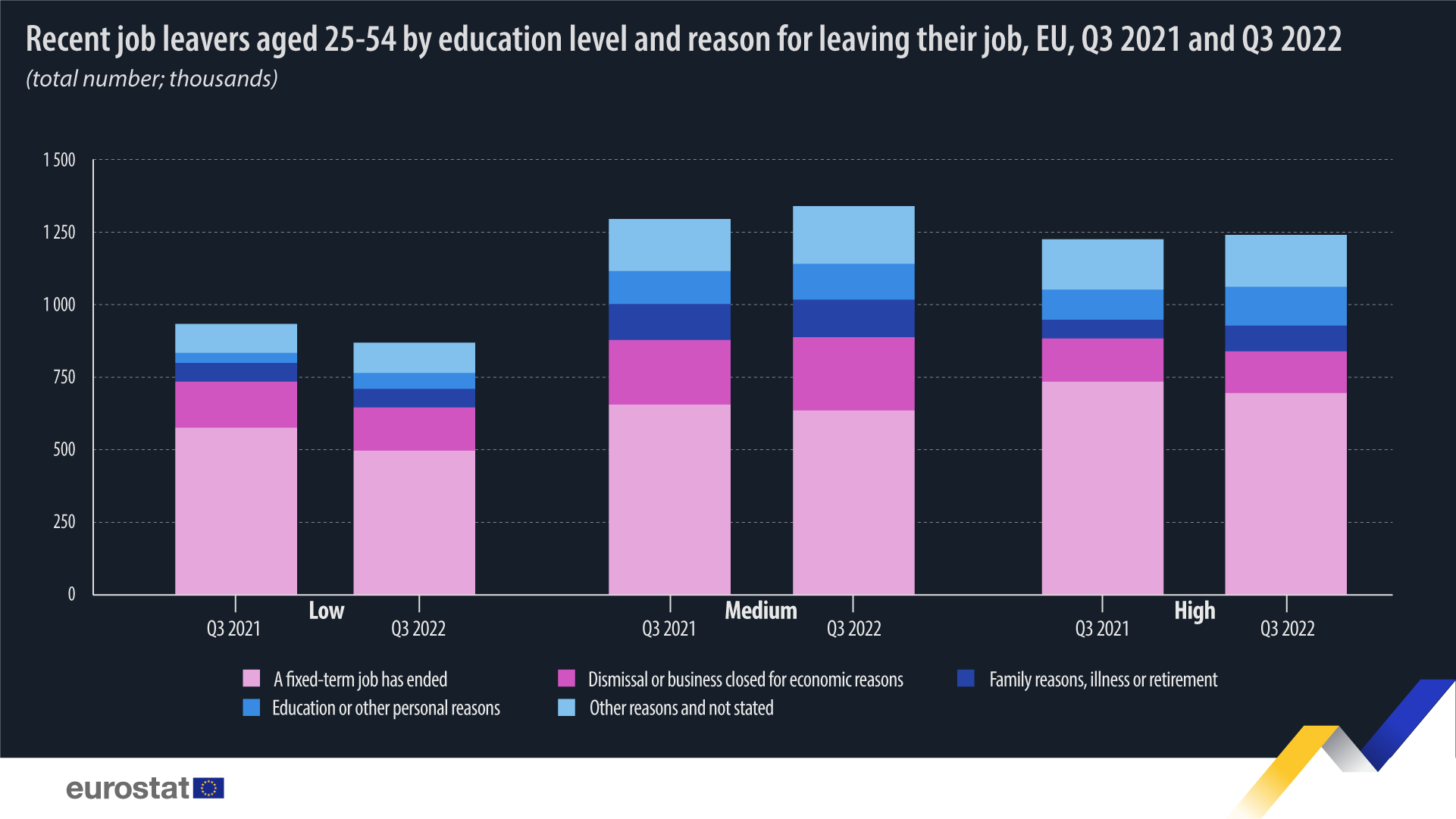3.5 million recent job leavers in Q3 2022 in EU

In the third quarter of 2022, there were 3.5 million recent job leavers in the EU between the age of 25 and 54. Compared with employment in the same age group, recent job leavers would represent 2.4 %. Recent job leavers are people who left their job in the last 3 months and are no longer in employment, here the focus is on those aged 25-54 years old.
In the third quarter of 2022, more than two-thirds of the recent job leavers (68.9%) had left their job for labour market reasons, meaning the end of a fixed-term contract, a dismissal or a business closure for economic reasons. This share was 3.2 percentage points (pp) lower compared with the third quarter of 2021. The importance of the labour market reason was even stronger among those with a low level of education (74.6%), followed by those with high and medium levels of education (67.8% and 66.2%, respectively).
More precisely, the prevalent reason to leave their jobs was the end of a fixed-term contract. In total, in the third quarter of 2022, 53.1% of total job leavers (1.8 million people) left their job because their contract ended, indicating a 3.9 percentage points (pp) decrease compared with the same quarter of 2021 (57.0%; 2.0 million people).
Across levels of education, the end of a fixed-term job had the highest share among job leavers with a low level of education (57.1%), followed by those with a high level of education (56.3%) and with a medium level (47.5%).
Source dataset: LFS ad-hoc extraction
The second most common reason for leaving a job was dismissal or a business closure for economic reasons, which concerned 545 thousand people (15.8% of all recent job leavers against 15.1 % in Q3 2021). Leaving their job for other or not stated reasons ranked third, affecting 478 thousand people (13.9%), followed by education or other personal reasons (311 thousand people; 9.0%) and family reasons, illness or retirement (283 thousand people; 8.2%).
Increase in people leaving their job for education or personal reasons
Compared with the third quarter of 2021, there was a +1.9 pp increase in the share of people who left their job for education or personal reasons (e.g. taking care of friends or non-relatives, wanting more leisure time, no need for work, travelling, changing place of residence etc.), from 246 thousand people to 311 thousand in the third quarter of 2022. This increase was more pronounced among those with a low level of education (+2.6 pp to 5.9%) and those with a high level of education (+2.5 pp to 10.8%).
Reasons to leave the job at national level for recent job leavers
In the third quarter of 2022, among the EU members, the highest shares of people leaving their jobs due to labour market reasons were recorded in Italy (89.9%), followed by Hungary (88.6%), Greece (87.6%), Spain (81.6%) and Croatia (70.6%).
Source dataset: LFS ad-hoc extraction
There was a large gap between the highest and lowest shares, with the lowest share recorded in the Netherlands (27.3%). This was followed by the Czech Republic (31.6%), Lithuania (32.3 %), Estonia (36.6%) and Ireland (36.7%).
For more information
- Statistics Explained articles on the labour market
- Statistics Explained article on the Key figures on the changes in the labour market
- Thematic section on the labour force survey
- Database on the labour force survey
Methodology
- Recent job leavers are defined as people who left their job in the last 3 months and are no longer in employment.
- Low data reliability for Croatia, Lithuania, Estonia and Slovenia.
- Missing data for too low data reliability in Malta, Luxembourg and Slovakia.
- The low educational attainment level corresponds to less than primary, primary or lower secondary education, at most; the medium educational attainment level corresponds to at most upper secondary or post-secondary non-tertiary education and the high educational attainment level corresponds to tertiary education.
If you have any queries, please visit our contact us page.

